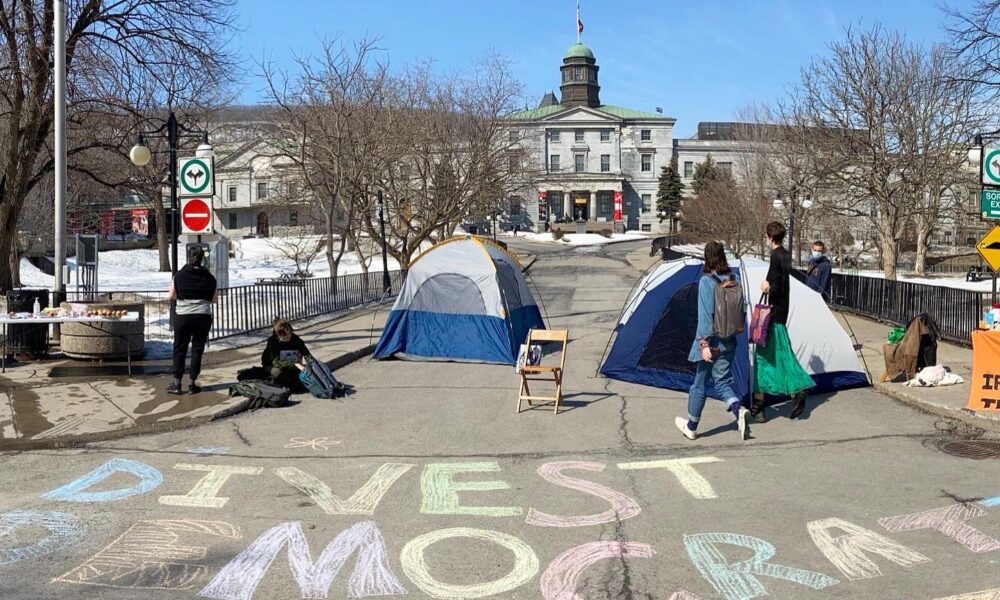After spending 11 days inside, Divest McGill took their occupation of the McCall MacBain Arts building outdoors on March 17. The student group set up tents to block the Y-intersection, preventing vehicles from using the pathway to get to the Arts building. Divest purposely planned the move outside on a warm day so that the group could interact with the students who gathered on campus to enjoy the weather.
Members of Divest painted banners, set up a station to give free haircuts, and distributed pamphlets to passers-by, including to campus tour groups with prospective students. Francis Dinh, U1 Science, was one of the students who stopped to listen and learn on his way to class. He spoke with the Tribune at the Y-intersection after a few conversations with Divest McGill members handing out pamphlets.
“Divesting from fossil fuels is really important,” Dinh said. “All the big names have already divested, like Harvard. I think that most people don’t care enough about the situation [….] So it is important for people to know as much as possible.”
Alex,* an organizer with Divest, described the long-term goals of the occupation.
“One of the goals of our occupation is to push and fight for university divestment from the fossil fuel industry, specifically the top 200 fossil fuel industry companies and TC Energy, which is currently funding the CGL [Coastal Gas-Link] pipeline in Wet’suwet’en territory,” Alex said. “Additionally, one of our long-term goals is to fight for democratization, and build a foundation for a more democratic university from the ground up.”
Divest’s occupation, Alex elaborated, has been focussed on interacting with the McGill community and demonstrating what community conversations and consultation looks like in real time.
“An occupation is an effective way to start building that foundation for democratic university because we are able to talk to people at all hours of the day, and reach people that otherwise might not be able to attend our events or figure out what’s going on,” Alex said. “The act of […] now moving out of the Arts Building is simply an extension of that effort to build a grassroots democratization and divestment movement. We are going to be able to talk to people that otherwise might not have even known that this occupation has been going on.”
Divest chose not to contact the McGill administration prior to or during the occupation, and the administration had not reached out to the occupiers either. Though administrators did not interact with the activists, McGill media relations officer Frédérique Mazerolle shared a statement to the Tribune about the occupation.
“Over the last couple of years, CAMSR [the Committee to Advise on Matters of Social Responsibility] has sought and welcomed comments from the McGill community—namely representatives of student associations who shared their support for the resolution adopted by Senate, and representatives of Divest McGill who shared their view on the effectiveness of divestment in responding to the threat of climate change—as well as subject matter experts,” Mazerolle wrote. “The University recognizes and supports the rights of its students to peaceful protest on campus.”
The occupation came to an abrupt end on March 18 when a positive COVID-19 case among someone who occupied the autonomous zone—a term Divest used for the space being occupied—led Divest to leave the Arts building in the interest of public safety.
“On Friday, March 18, Divest made the challenging decision to pack up camp and cancel the events we had planned after someone who had slept and spent considerable time in the autonomous zone tested positive for COVID-19,” Divest said in a group statement to the Tribune. “However disappointing, the swiftness of our decision reflects the purpose of this occupation: We sought to enact the structures and relationships we wish for the university at large. Under our vision, public health and well-being are of the highest priority.”
*Alex’s name has been changed to preserve their anonymity.








